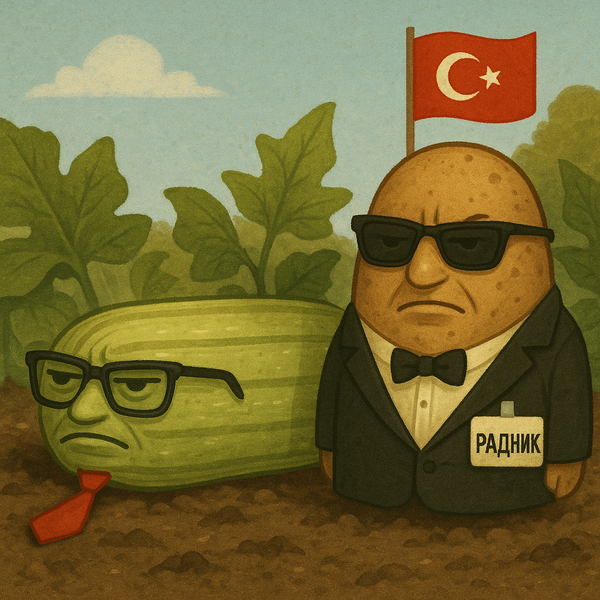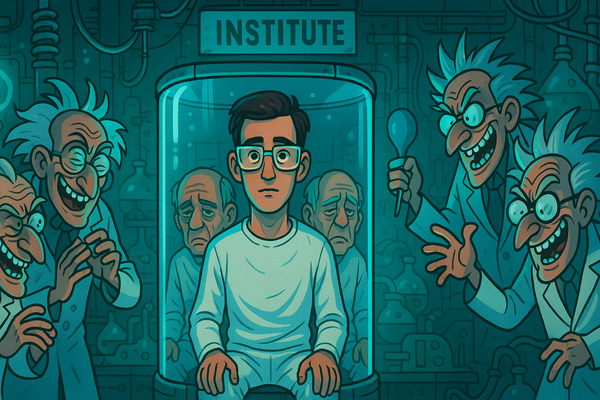The Second Week
First Week Report
So, the first week is over. I give it a personal score of 70 out of 100. But since it was the very first one, I consider that a pretty decent result. 😌
I slipped only one day, and it was one of those “if the house is on fire, let the barn burn too” kind of days. I had been staying at the Institute of Gerontology since the beginning of the week, and on Wednesday afternoon, I went to visit my parents.
I stayed within my calorie limit through the evening and night — everything was fine — but on Thursday morning, I made the mistake of taking with me some food my mom gave me 👩
I started the day with couscous served in the hospital canteen but then added a pâté sandwich, then some meat, and then thought, “might as well try a pancake too…”
Later in the evening, I realized I had already exceeded my daily limit, and decided: “Whatever, let’s go all in today,” and ordered two more pancakes through Glovo — one sweet and one savory. 😀
In total, I hit about 3300 kcal that day.
The other days were within the limit — nothing much to comment on.
Fasting and Autophagy
Turns out, it’s not such a complicated thing after all.
I should mention that I started fasting based on the recommendation of my friend Valera, who showed through his own experience that this kind of self-discipline can be effective.
While I was in the hospital, I did some digging and learned a few interesting things.
Looking up fasting rules, I kept running into the word “autophagy.”
I knew what the process was (when a cell digests its own dead or damaged parts using lysosomes — sort of its internal cleanup crew), so I didn’t understand what fasting had to do with it. Autophagy is a natural and constant process that occurs in all cells.
So, all those loud promises about “accelerating autophagy with fasting” sounded like Insta-charlatanism to me — people selling weight-loss or muscle-gain schemes wrapped in scientific terms most people have forgotten since school.
However, to my surprise, in 2016, Japanese scientist Yoshinori Ohsumi won the Nobel Prize in Physiology or Medicine for discovering the mechanisms of autophagy.
After reading his pamphlet, I realized the point of fasting is precisely to stimulate autophagy.
So how do you do it? Basically — very simply.
Our body draws energy from different sources, step-by-step (explained simply — thanks, GPT):
🕐 0–4 hours after eating
Food is being digested, glucose and insulin levels are high.
Energy comes from food; excess is stored as fat and glycogen.
🕓 4–12 hours
Insulin levels drop.
The body starts using glycogen — glucose reserves in the liver.
Fat burning hasn’t started yet, but glucose is already being depleted.
🕛 12–16 hours
Glycogen runs out.
The body begins breaking down fat → fatty acids and ketones are produced.
The brain starts switching to ketones for energy.
🕔 16–24 hours
Ketosis begins — fat is the main energy source.
Autophagy is activated — cells “digest” damaged components.
Insulin is very low, and the body is in fat-burning mode.
🕗 24–48 hours
Autophagy is at its peak — the body clears out “junk”: damaged proteins, old cells, faulty mitochondria.
Growth hormone increases — muscles are preserved, cell renewal speeds up.
Weight decreases, energy stays stable.
🕘 48–72 hours
Deep cleansing continues.
Immune system regeneration may start (new white blood cells are produced).
If unprepared, fatigue may kick in.
🛑 After 72 hours
Risk of muscle loss increases without experience or control.
Gluconeogenesis from proteins begins — the body breaks down muscle for glucose.
⸻
🔑 Main benefits:
• Fat, not muscle, is burned (up to 72 hours).
• Autophagy is activated — helps prevent aging and diseases (Alzheimer’s, Parkinson’s).
• Insulin resistance decreases — helps with excess weight.
No surprise that this caught my attention 😌
Briefly:
With Parkinson’s disease, the brain’s nerve cells accumulate a protein called alpha-synuclein. Technically, this protein forms in everyone, but in PD, autophagy is disrupted, which impairs its disposal.
These proteins clump into structures called Lewy bodies, which are toxic. Here’s the biochemical magic: the protein itself isn’t toxic, but when it aggregates, its structure changes and becomes harmful.
The toxic protein damages the cell, the cell dies, and its place is taken by gliosis tissue — functionless cells that simply fill the gap.
The idea is that after 24 hours of fasting, when autophagy peaks, cells may better fight alpha-synuclein — which in theory could slow disease progression.
Clinical trials are already underway, but I have nothing to lose by trying this approach now.
Note: autophagy starts after 16 hours of fasting — so even 18-hour sessions are helpful. At 24–36 hours, it runs at full power.
IMPORTANT!
During fasting, you must not consume anything except water — and maybe tea (without additives).
If your goal is to improve health by activating autophagy, not even a crumb of food is allowed — digestion will restart the clock.
If your goal is weight loss, then ~500 kcal per day is acceptable.
My experience:
I eased into it.
• First day: 14/10 (fasting/eating window)
• Then 16/8
• From Wednesday to Saturday: 18/6
• Saturday: full 24-hour fast
Everything went smoothly. No side effects.
In fact, the effect of anti-Parkinson’s meds lasted longer.
Have a great week, everyone!

